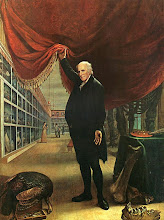
Monday, May 5, 2008
Liberal comics of the 1960s: Power and Responsibility
Below you should see two panels that form more or less of a mission statement for the most beloved and influential superhero comics of the 1960s. Based on what you have read, how did comics reflect the politics of the Kennedy era, and after? What were (and are) their strengths and limitations as political and social documents of the time? (History 4004 students can post answers below for discussion credit.)


Subscribe to:
Post Comments (Atom)





4 comments:
The "reluctant superhero" was introduced in the comic world with Fantastic Four, according to Wright's comic book nation. The reluctant superhero in the comic books marked a new way of thinking about social responsibilities. The introduction of Spider Man in the 1960s took this a step further.
This moment, where Spider Man mourns the death of his uncle, who he could have saved, showcases the comic's liberal ideas. It is a reflection of American politics of the time. It is a very Kennedy-esque way of thinking. Kennedy and Johnson saw America as already the greatest power in the world, and now it was our turn to give back. We would eliminate the "pockets of poverty" in our world. Whether it was his executive order creating the peace corps or the push for the civil rights act or even our ongoing "duties" of containment, this moment in Spider Man parallels the Kennedy ideal that we use our great power to help other people.
I agree with Taylor in her assessment of many superheroes being sort of liberal reformers during this era. The parallels between the superheroes helping the poor average citizen and America helping the poor average country are obvious. And this connection that comics have to politics would only intensify in the following decades as you could argue that "Dark Knight Returns" portrays Batman as a sort of neo-conservative crimefighter.
Where I think these comics are at least somewhat limited, at least from the Silver Age, is that the target audience were children. While there are certainly social and political underlying themes, I don't think the authors were trying to produce social commentaries on America's place in global politics.
I think some strengths that comics had were how consise they were. The points of view and political issues of the authors were conveyed within fewer pages than a conventional novel. The authors could also be as blatent for a particular cause as they wanted to be.
Limitations as political and social documents come down to comics are cartoons. Before this class, I had never been an avid reader of comics, I thought they were just for kids. I know differently now but the perception of some people is that comics are a form of entertainment for children.
This mantra is without a doubt a reflection on U.S.liberalism of the sixties. I like the way Wright expresses it in similar words, "Awesome power often comes at high cost and carries tremendous burdens", This was true for the government as well as comics because this was around the time that comics crept up on college campuses. They had to address the issues but also try to not overstep their boundaries.
Post a Comment